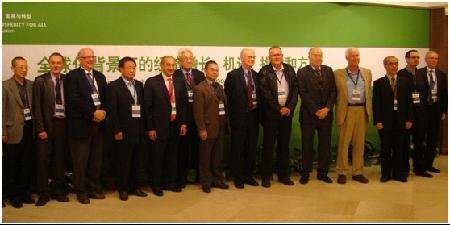Peking University, Nov.8, 2011: The second session of Economic Sub-forum of Beijing Forum 2011, titled "Regional Integration and Economic Growth", was held at Peking University (PKU) Yingjie Overseas Exchange Center on the morning of November 11, 2011.
Initially, Professor James Mirrlees, the 1996 Nobel Laureate in Economics, gave his speech on Optimal Saving, Investment and Growth in open economics. Taking China as an example, he illustrated the current situation that China has more saving than investment, and suggested China change from the lender to the borrower in order to transform the short-term economic boom into a long-term stable economic development. The older generation, as he mentioned, should have more consumption to sustain the economic growth.
Professor Jwa Sung-hee from South Korea elaborated his research on "General Theory of Economic Development Lessons from Japanese, Korean, Chinese, as well as the World’s Economic Development Experiences" by illustrating the role of the government and the cooperation played in economic stagflation, drawing to the conclusion that success only can be achieved by those who help themselves, and economic development calls for joint efforts from government, corporations and market.
Afterwards, Professor Christopher J. Berry from Britain presented his opinion from an interesting perspective: "Luxury and Ethics of Consumption". Firstly, he talked about the origin of luxury in ancient Greece and then its meaning transition in the Renaissance, which was regarded as a kind of corruption at that time. However, the desire for unnecessary things, i.e. the definition of luxury by Professor Berry, is the driving force behind the economic development to some extent. In the end, he stressed that it’s essential for people to change their extravagant lifestyles now.
Regional alliance in the economic system has been quite popular in recent years. Among all the presentations, four of them were dealing with this topic or the related.
Professor Shimizu Tetsurou from Japan briefed on us the current debate concerning TPP (Trans-Pacific Partnership) in Japan. He explained to us some major worries on TPP: first, TPP negotiation was initiated by the USA, so the rules of it must be beneficial for it; second, the TPP will destroy the unity of east Asian countries; third, the TPP will cause damage to the high-cost Japanese agriculture and weaken the food security; last, the investment rules which the USA wants to introduce in the TPP will threat the economic sovereignty.
Then Professor Pak ZongChol from North Korea gave his speech on "The Economic Cooperation in Northeast Asia and Its Perspective". He pointed out that the successful economic cooperation depended on two premises: respecting the differences among countries, and preserving sovereignties and key benefits of related sides.
Professor EskilWadensj? from Stockholm University focused on the regional integration of labor markets and its growth. He reviewed the history of the development of the first common labor market in Europe along with its impact to countries related. The common labor markets have lead to increased migration and also commuting between the member countries. This has facilitated the recruitment of workers for expanding industries.
From the perspective of business, Mr. Hani Findakly from the US stated the Role of Regional Alliance in Economic Development. There are approximately 30 economic alliances currently in the world, ranging from common markets to customs cooperation. He analyzed the underlying reasons for a successful alliance: similar trade systems, comparable GDPs and limited differences in geography and politics. Specifically, he pointed out that a regional alliance didn’t have much effect on economic growth, but it could accelerate economic reform and facilitate labor force transformation.
Professor Ki-seok Kim from the University of Seoul gave his speech on the historical comparative view on intellectual excellence in the East and the West. He introduced the Neo-Confucianism which is widely studied in South Korea. A variety of non-formal and less institutionalized (NFLI) academic networks was training Korean literati in the way of Korean Confucianism, including the family school, the Letter Hall, and the private seminary. Then he draw to the conclusion that Eastern traditional education could be competitive to the Western one and that also has been demonstrated.
The last speaker, Professor Reginald Little from Australia, also focused on Confucianism from the angle of Western sight. He indicated the differences between East and West education regimes: students in China tends to contribute much more dedication to academic works; besides, some unique qualities of Chinese people, which have been influenced by Confucianism, have important contributions to make in re-evaluating many of the certainties of “progress” over the past two centuries. Thus he gave us the suspense by referring the "Closing Days of Anglo-American Global Order".

The group picture of participants
In the discussion part, scholars and students raised many questions concerning on globalization and Confucianism, as well as issues about the world.
Reported by: Fang Runiu
Edited by: Arthars